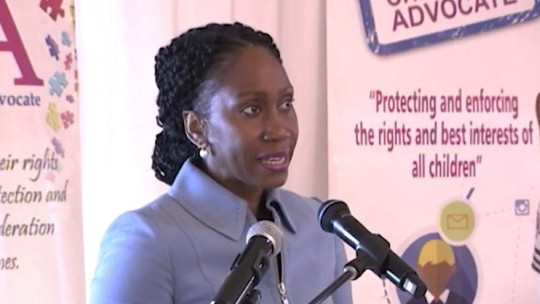.png)
Children's Advocate Diahann Gordon Harrison
By Racquel Porter
Children's Advocate Diahann Gordon Harrison has sought to clarify a proposal for Jamaica to enact legislative changes for the decriminalisation of children engaging in sexual activities.
Sexual offences accounted for 363 of the 1,034 cases listed for the Hilary term of the Home Circuit Court, which began last Tuesday.
The country's acting chief prosecutor, Claudette Thompson, disclosed last week that children are the complainants in a number of the sexual offence cases.
The proposal, which was first made to Parliament four years ago, has been a topic of discussion recently.
In an attempt to clear up misinformation surrounding the proposed legislative changes, Mrs. Gordon Harrison sought to further explain the suggestion.
"So when we're talking about sex between minors, it does not include where minors force their counterparts into sexual situations. It does not include, for example, a gang rape; it doesn't include a battery where boys just feel like, all right, it's time now we're going to earn our spurs; it doesn't include any of those situations. What we're talking about, however, is where you have two young people who think they're in love. So you have an 11th grader or two 11th graders, they both happen to be below 16 or you have a 17 and a 15 [year-old] and they have been dating for a while, and then one thing leads to the other in the heat of the moment and hormones get out of control," she explained.
Mrs. Gordon Harrison, while admitting there should be consequences in those instances, suggested that a conversation about sexual reproduction is necessary.
"But our view is that when you place those children before the court, you have more disruption than you have good. For instance, it is usually the boy who is criminalised and placed before the court. His education is interrupted with the frequent visits to the court. It is a girl who is in love with her boyfriend and is now traumatised because she's being forced as it were. And these are the cases we're talking about where somebody finds out and the girl is forced to make a report.
"She doesn't want to and she goes through all kinds of emotional and psychological issues because of it. And the boy is interrupted. What we have in the natural progression of those cases is that they actually do not get resolved in a way that the public thinks. The boy is not in fact sent to prison in many instances because the girl actually does not eventually end up giving evidence against her boyfriend," she outlined.
Mrs. Gordon Harrison said strict and firm conditions would have to be in place for minors to benefit from the close in age exception included in the proposal.
"So it can't be a 15 and a 25 or a 17 and a 12 [year-old]," she insisted, while acknowledging that the proposal has not defined the specific ages because this requires consultation along with Ministry of Health counterparts who focus on sexual and reproductive health and hormonal changes.
"So we're not being prescriptive in the age, but what we're saying is that if they are girlfriend and boyfriend, they're in an exclusive relationship; they're having their little puppy love thing and something happens within that context. So there's no force, there's no fraud, there's no coercion, there's no manipulation, there is in fact no aggravating circumstances present. Let us talk to them about the beauty of delaying sexual activity, about abstinence, about self-control, about focusing on your books and getting where you need to get in life instead of saying, put it before the court and there's no meaningful resolution. So we're looking at the roots of the problem," the Children's Advocate maintained.
She was speaking with TVJ's Smile Jamaica host Simone Clarke on Tuesday morning.
comments powered by Disqus







 All feeds
All feeds







